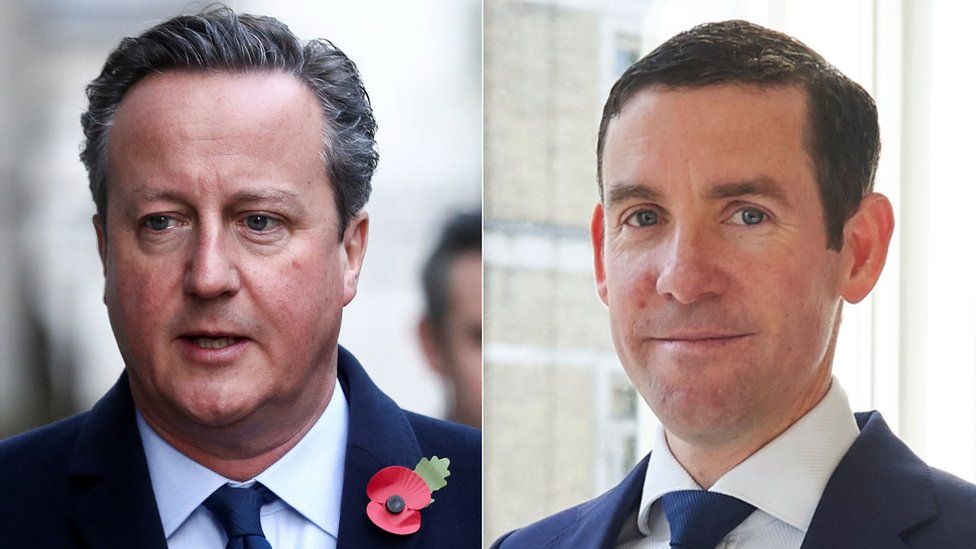Newly released texts reveal extent of David Cameron's Greensill lobbying
- Published

Texts published by the Treasury Committee reveal the extent of David Cameron's lobbying for the now-collapsed firm Greensill Capital.
Between 5 March and 26 June 2020, the ex-PM and his staff sent ministers and officials 45 messages on behalf of the company, including to the chancellor.
The committee is examining Mr Cameron's role in trying to access government funding for the financial company.
Company founder Lex Greensill appeared at the committee earlier on Tuesday.
Answering questions from MPs, Mr Greensill said he bore "complete responsibility" for the failure of his company adding that he was "desperately saddened" by the job losses.
Mr Cameron is due to face MPs on the same committee on Thursday afternoon.
Reports of Mr Cameron's lobbying for Greensill prompted Prime Minister Boris Johnson to order a review by lawyer Nigel Boardman into decisions made in government around the finance scheme and the role of Mr Greensill.
The Treasury Committee also published a letter from the Financial Conduct Authority (FCA) in which it confirmed it is formally investigating the company.
The Treasury Committee's documents - provided by Mr Cameron - revealed that the former prime minister made strenuous efforts on behalf of Greensill including sending nine WhatsApp messages to Chancellor Rishi Sunak and 12 texts to Sir Tom Scholar, the permanent secretary of the Treasury.
Mr Cameron also contacted Cabinet Office minister Michael Gove and vaccines minister Nadhim Zahawi, as well as ministers in the Treasury.
Greensill had hoped to take part in a government scheme - the Covid Corporate Financing Facility (CCFF) - set up to help businesses during the pandemic.
However the Treasury rejected their application concluding the firm's proposals were not suitable.
'This seems bonkers'
On 3 April, Mr Cameron contacted Sir Tom: "Again Greensill have got a "no". Am genuinely baffled. Letter says CCFF is there to provide liquidity for "non financial corporates". That is what we do. The fact the notes are issued by a financial entity is irrelevant. The recipients of the money are all non financials and mostly SMEs [Small and medium enterprises]! Can I have 5 minutes for a call? This seems bonkers. Am now calling CX, Gove, everyone."
And on the same day he messaged Mr Sunak: "HMT are refusing to extend CCFF to include supply chain finance, which is nuts as it pumps billions of cheap credit into SMEs... think there is a simple misunderstanding that I can explain."
Also on 3 April, Mr Cameron messaged Mr Gove: "I know you are manically busy - and doing a great job, by the way (this is bloody hard and I think the team is coping extremely well). But do you have a moment for a word? I am on this number and v free."
Lex Greensill appears before Treasury Select Committee
Later that month on 22 April, Mr Cameron wrote to Mr Sunak: "Just to report back. Three weeks later and while constructive conversations have taken place, the situation is still stuck."
"Could you try and give it another nudge over the finish line - this is clearly in the national interest, creates instant value for tens of thousands of SMEs and complies with the spirit (and we believe the letter) of the CCFF Market Notice?"
Responding to criticism over his lobbying efforts, Mr Cameron released a statement last month in which he acknowledged he should have contacted the government "through only the most formal of channels".
However, he insisted that he had not broken any codes of conduct or government rules on lobbying.
The collapse of Greensill - which filed for insolvency in March - has threatened thousands of UK jobs at Liberty Steel, which was dependent on it for its financing.
Giving evidence to the Treasury Committee, Mr Greensill said that his company had sought to take part in the CCFF scheme to ensure "continued liquidity" for its clients which included small businesses.
Committee chair Mel Stride asked if he was also motivated by a desire to "shore up against potential problems" Greensill itself might face during the pandemic.
Mr Greensill replied that his company had "at no time sought funding for itself" from the CCFF scheme.
He also said there had been "no loss to the UK taxpayer" from Greensill's collapse.